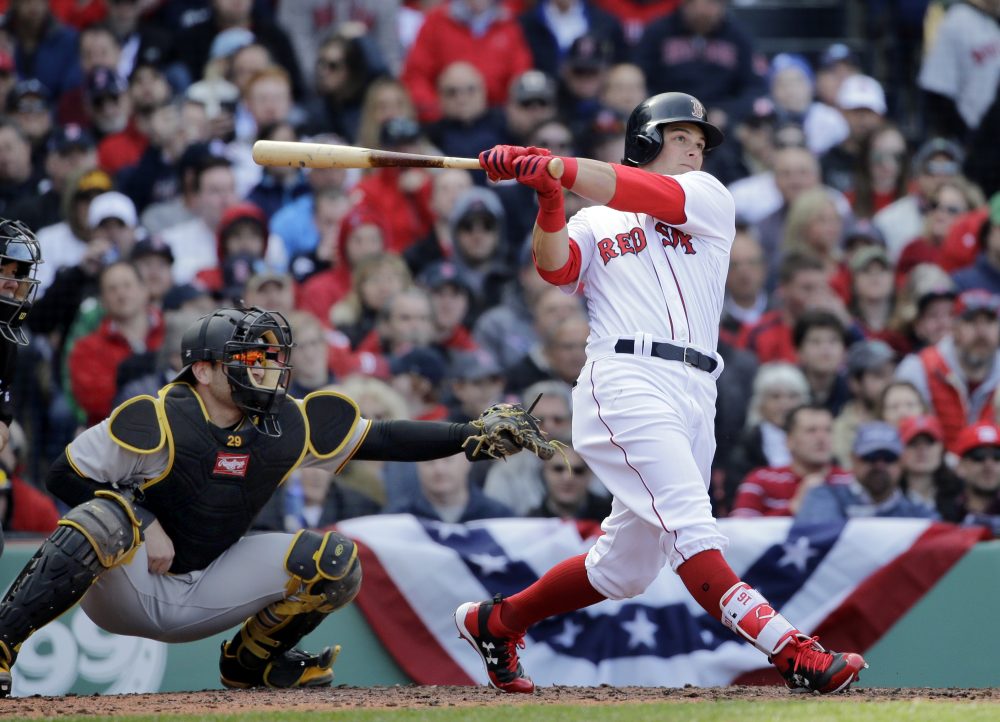Lists have been created this offseason determining the top ten players at each position for right now. I have been writing my own series on top tens; except instead of doing them for just the here and now, mine factor in age and determine who the best players are to own for the long haul. These lists obviously differ from others, as someone in their mid-30’s isn’t nearly as valuable in the long run. So, when I put a young guy ahead of someone in their 30’s, I’m not necessarily saying I think he is going to be better this year.
1. Andrew Benintendi
I know, this takes a leap of faith on my end to think Benintendi is number one. There is another player in his 20’s who had a breakout season last year and was truly a star. So how can I put Benintendi above him? Whereas I do believe in that player’s breakout, I do not believe in the extent to which he broke out. Benintendi will only improve upon his rookie season. It might be hard to justify putting him in this spot based on what’s happened so far, but if I am holding true to myself, this is where I put him. I believe Benintendi is a star for years to come and will have more long-term value.
Benintendi is an all-around player, posting the first 20-20 season by a rookie left fielder since Barry Bonds 30 years earlier. He has a sweet swing, often drawing comparisons to Fred Lynn. He is an excellent fielder, looking incredibly smooth playing the monster in left and getting the ball quickly back to the infield. Benintendi had 11 assists from left last year, leading the league. Benintendi batted .271 last season, but was a .312 career hitter in the minors. He also drew plenty of walks, a rare quality in someone so young, leading to a .352 on-base percentage.
Based on his minor league numbers and his stature as the best prospect in baseball, I expect a lot more from Benintendi in the near future. Maybe he won’t be the best left fielder as soon as this year, but I think he will be closer than some expect. I think in the long run he is a .300 hitter with a .370-.380 on base percentage. With this would come a 25 home run bat and 20 steal potential on the basepaths. Oh, and don’t forget about that glove. Benintendi will be a star in the near future.
2. Marcell Ozuna
Ozuna is the player I referenced above. He was the best left fielder in baseball last year, and did it at the age of 26. It makes sense at that age that he would take a step forward, I’m just not sure I’m buying how much he did so. Ozuna was a career .265 hitter before last season, when he batted .312. He did have power, homering 23 times in a season twice. 37 is a large leap from 23 though. His at-bats per home run dropped from a previous best of 24.2 down to 16.6. Ozuna’s previous best ratio of home runs per fly ball was 12.6% in 2014. Last year, that number jumped from 10.3% in 2016 to 16.5% of his fly balls going for home runs last season. With the juiced balls in play, is that number sustainable moving forward if the balls are normalized?
All that said, I like Ozuna. He had shown signs of a breakout early in 2016, batting .307 with 17 home runs in the first half. It makes me believe in his breakout as a hitter, I just don’t see him hitting .312 with 37 homers again. He strikes out more than the league average hitter, so such a lofty average will be hard to maintain. He also had a .355 BABIP, higher than his career average of .318 to that point. I see Ozuna as more of a .280 hitter with possible 30 home run power. That’s still an excellent player. He also is a good fielder, taking home the Gold Glove for the position last season. Ozuna hadn’t been a good fielder prior, but he had been playing center field. He seems to have found a home in left.
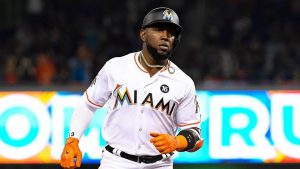
3. Christian Yelich
Back to back Marlins from last year, now on different teams. Yelich played center in Miami, but in his new home of Milwaukee will be manning left field. His defense should play up in left field with less ground to cover. He is 30 defensive runs saved above average in his career as a left fielder, against a -13 total in center. He also should benefit from his new home park, which is much friendlier to hitters. Yelich is a career .280 hitter at Marlins Park, with just a .398 slugging percentage. On the road he bats .300 with a .462 slugging percentage. In his new park, and with good hitters around him, I expect we will see a full season of that road version of Yelich.
4. Justin Upton
Justin Upton is still only 30 years old, after breaking in as a teenager back in 2007. He is a notoriously streaky hitter and can be inconsistent from year to year. Two years ago he struggled all year long, then hit 13 home runs in September. Last season, he followed up a two homer July by hitting 11 home runs in August. This is a pattern he has shown his whole career. What it usually plays out to is a mediocre average with 30 home run power.
Upton is one of the biggest strike out hitters in the game, whiffing in 28.5% of his at-bats over the last two years. He isn’t going to suddenly hit for average. But he does draw some walks, and he’s likely going to threaten 30 home runs for the third straight year. Getting to bat near Mike Trout shouldn’t hurt. Upton has stolen 20 bases a couple of times, though those days might be in the past, he did steal 14 bags last year.
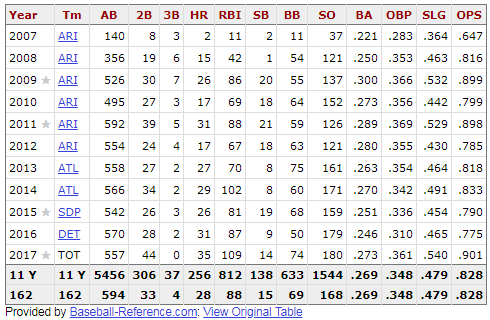
5. Yoenis Cespedes
Cespedes has improved mightily as a hitter the last few years. He is still a little free-swinging, but he has cut down his strike out rate some and improved his home run rate. With it, his average has climbed. A .251 hitter between 2013 and 2014, Cespedes has batted .287 over the last three years. His strike out rate the last two years has been below 20%, which is better than average. Before injury, Cespedes was well on his way to a third straight 30 home run season last year after never reaching that mark in his first three seasons.
Cespedes is dropped some because he is coming off an injury plagued season and is now 32 years old. If I were doing this list for just 2018, he might be number one. But how much longer will his body allow him to perform at a star level? He missed extended time twice last year with leg injuries.
6. Rhys Hoskins
Hoskins is the new guy on the scene, and at a new position. Hoskins played first base throughout his minor league career, but the Phillies have decided to move forward with him as their left fielder. Time will tell how he handles the position. His bat is a force to be reckoned with though, and that’s why the Phillies are making a spot for him. Hoskins hit 38 home runs in AA in 2016, posting a .943 OPS. He kept it up last year, hitting 29 home runs in AAA before his call-up. Hoskins then went on a rampage, hitting 18 home runs over 170 Major League at-bats, posting a 1.014 OPS. That’s 47 home runs between the two levels.
Can Hoskins hit like that for a full season? He has the right approach, taking pitches and working walks. He walked 37 times last season, giving him a stellar .396 on-base percentage despite a .259 batting average. His walk rate wasn’t quite that high in the minors, but he did draw walks. It seems that even if he bats .260, he could put up a nice .360-.370 on-base percentage. Couple that with his power, and Hoskins might be a star in the making.
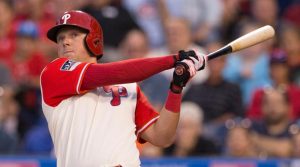
7. Trey Mancini
Trey Mancini seems to be that type of player that scouts never love, but he just performs every year. Mancini never made a top prospects list, despite hitting at every level. In 2015, he batted .341 with 21 home runs, including a .359 average at AA. He hit .306 for his minor league career, and the production has continued into the majors. In his first full season, Mancini batted .293 with 24 home runs last season. He continues to prove his doubters wrong.
There are a couple of things he could improve upon. Last season, Mancini struck out 139 times against just 33 walks. Both rates were worse than the league average. Given more experience, he could improve that contact rate though, he was a rookie. Given his power and his minor league numbers, I am not going to doubt him.
8. Eddie Rosario
Rosario broke out in a big way last season, but he’d shown promise before then. Rosario led the league with 15 triples in his rookie season of 2015. Problem was, he also walked 15 times. The next season, he again posted solid numbers, except for walks. So what made his breakout last season when he batted .290 and hit 27 homers? Well, it wasn’t luck. His first two seasons, Rosario had a .335 batting average on balls in play. Last year, that number actually dropped quite a bit, down to .312. Part of that has to do with his increase in home runs. Rosario cut his strike out rate from over 25% down to 18% while modestly improving his walk rate. So he is showing strides at the plate.
There is some pedigree to Rosario too, as he was a career .294 hitter in the minor leagues with an .825 OPS. His .836 OPS last year looks to be pretty well in line with what he did down on the farm. He also clearly exhibited extra base ability before last season, and it would stand to reason that as he filled out some he would hit a few more home runs. Rosario is never going to walk a lot, but he should hit for a decent average with some pop.
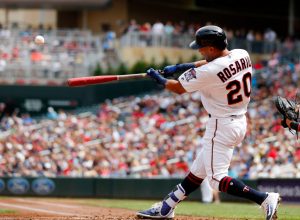
9. Adam Eaton
At 29, Eaton is coming off a torn ACL that cut his debut season with the Nationals short. It happened early in the season, and Eaton should have no problems being back to his normal self this year. That player had been a very consistent one, posting nearly identical numbers in both 2015 and 2016.

It would certainly seem reasonable to expect stats similar to those again. Eaton doesn’t excel at any one thing, but he is a pretty solid across the board contributor. He was not cut out for center field, consistently putting up below average defensive statistics there. However, he should be a good fielder in left where he doesn’t need as much range. Eaton was 22 defensive runs saved above average as a right fielder in 2016. He’s never quite been the stolen base threat he was expected to be, but he can still steal a few bases. Eaton will give you a little bit of everything.
10. Kyle Schwarber
Schwarber’s play last season doesn’t merit a spot here, but I believe there is a lot better hitter inside him. He was coming off a big injury, and didn’t have much development time before then. Schwarber was the fourth overall pick in 2014 and proceeded to post a 1.061 OPS over half a season in the minor leagues. He again had an OPS over 1.000 the next year at the time of his call-up. The guy could flat-out hit; he had power, he didn’t strike out too frequently and he put up huge numbers. Up in the big leagues the year after he was drafted, Schwarber hit 16 home runs in 69 games and posted an on-base percentage over 100 points higher than his average. He was all the rage heading into the next season, which was over practically before it started.
It is much too early to give up on Schwarber. Everyone was in love with the guy, then after a catastrophic injury and one down season everyone wants to throw in the towel. Yes, he hit .211, but he again had an on-base percentage over 100 points higher. He also homered 30 times, and posted a solid .782 OPS. Maybe he will never hit for average like he did in the minors, but I doubt he will strike out 30% of the time and bat .211 again. He could easily win some people back this season by hitting .250 with a .350 on-base percentage and 30 home runs. I have him in the ten spot because I believe he can be a force at the plate again. Please, get the man out of left field though, he does not belong out there.
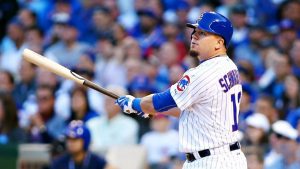
Honorable Mentions:
Adam Duvall, Marwin Gonzalez, Michael Brantley, Yasmany Tomas, Brett Gardner
Feature picture from wbur.org
